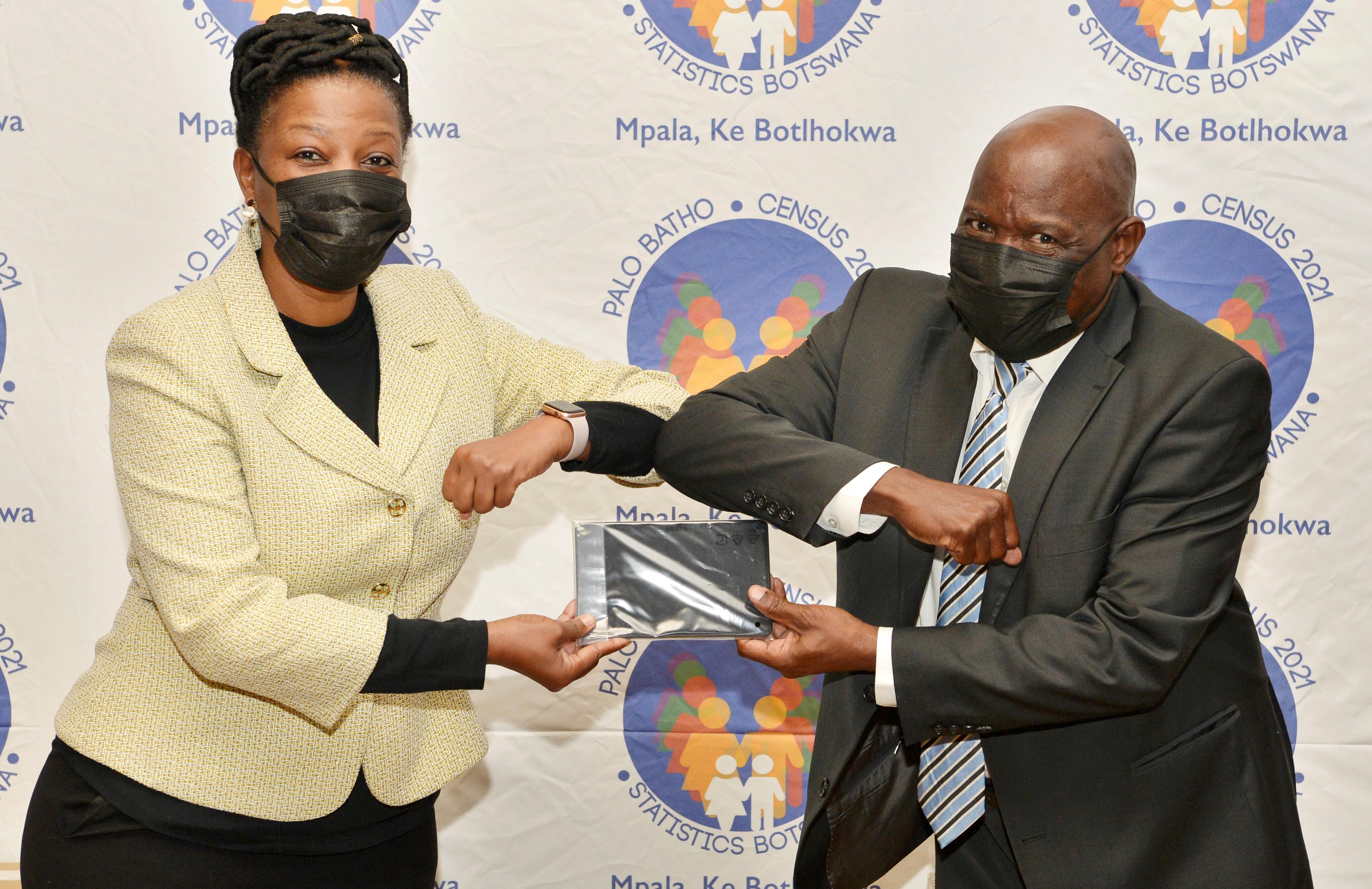GABORONE, Botswana- The United Nations Population Fund (UNFPA) handed over 100 tablets to Statistics Botswana to support ongoing preparations for Botswana’s first ever digitized Population and Housing Census, scheduled for 2022.
The tablets represent 100 out of the 180 tablets required for implementation of the pilot census scheduled to take place in August 2021. Strengthening national capacity to ensure high quality population census, that meets international standards is one of the core mandate of UNFPA. The 2022 census will be Botswana’s 6th national census since independence.
Population and housing census is one of the primary sources of data needed for formulating, implementing and monitoring policies and programmes aimed at inclusive socioeconomic development and environmental sustainability. It is an important source for supplying disaggregated data needed for the measurement of progress of the 2030 Agenda for Sustainable Development at global level and Vision 2036 in Botswana.
Presenting the tablets, UNFPA Head of Office Ms. Mareledi Segotso commended the government of Botswana for the commitment in conducting the population and housing census every 10 years since 1966 as recommended in United Nations Principles and Recommendations for conducting population and housing censuses. She underscored that this puts Botswana on track to achieving SDG indicator 17.19.2 that requires member states to conduct at least one population and housing census in every 10 years.
Ms Segotso said national statistics offices needed to make timely, strategic choices about adoption of technology solutions relevant to their context including technical expertise, ICT infrastructure and connectivity.
She said UNFPA’s support towards a successful census has been shaped by priorities such as building on experiences of previous censuses, identifying and sharing intelligence on new census technology solutions and methodologies.
The other priority shaping our support is the need to advocate for appropriate, efficient and effective technology solutions for census data collection, processing, analysis and dissemination
Receiving the tablets on behalf of the government, Statistician General, Dr. Burton Mguni said the 2020 round of censuses is characterized by countries’ increased adoption of digitalization where use of handheld devices in mapping and data collection is the practice.
“Botswana has not been left behind because Statistics Botswana has adopted this approach for the conduct of the 2021 Population and Housing Census (PHC), therefore this devices will facilitate this,” he said.
Modern censuses are driven by harnessing technology so as to improve efficiency and quality of the data in terms of enhanced collection operations, data entry, processing, analysis and dissemination. The global trend in relation to improving efficiency and quality of census results is the use of latest technology to conduct a paperless census. Thus, the 2022 PHC will be implemented differently from the previous censuses. It will be the first to be a digital census employing technology where data collection is combined with data processing and entry and cartography/mapping using digital platforms.
Dr. Mguni said this digital approach will go a long way in ensuring that the quality of data continually improves and the time to release the census results is shortened. This he said would facilitate having real-time information, thereby, keeping pace with the ever increasing demand for baseline data and information required to timely inform national and international development agendas, such as the NDP11, V2036, Agenda 2030 of SDGs, Africa Agenda 2063, as well as, further investigations through surveys and research programs.
The 2020 census round (2015 to 2024) will be conducted in the context of new commitments to identify and redress inequalities between and within countries, across a wide range of development indicators. The 2030 Agenda for Sustainable Development, has placed the highest priority on ensuring that “no one is left behind”, calling on national statistical systems to disaggregate national indicators and monitor inequalities as a matter of human rights. This aspiration places a high demand on national data ecosystems, and on data disaggregation in particular. The population census is a key element of national data ecosystems and the source of population denominators for about 96 SDG indicators.
UNFPA’s support to the government of Botswana towards a successful census has been shaped by a few priorities such as building on the experience of previous census rounds, to identify and share intelligence on new census technology solutions and methodologies, with a view to identify south-south cooperation opportunities. To that end, UNFPA facilitated peer learning through a multi country census tour where four countries (Botswana, Liberia, Republic of Tanzania and Uganda) drew from the experiences of Kenya in implementing its first ever digitized census.
UNFPA further supported Statistic Botswana in the development of a comprehensive Census Project Document (CPD) that will guide the 2021 Population and Housing Census (PHC) undertaking. It has been a tradition to develop CPD for censuses since 1981 to present. The CPD is intended to define what census is and spell out processes and procedures of conducting a census with a breakdown of activities by different components of the census cycle. It goes further to present the total estimated budget broken down into major components or milestone by financial years from 2018/19 to 2022/23. The census project document is also an important instrument to use in resource mobilization, advocacy for the 2021 PHC, as well as, providing guidance on stakeholder roles and participation on the project.
As the COVID-19 pandemic continues to wreck havoc globally, many national statistics offices have also felt this impact, which has caused many Governments to postpone or delay their population census conducts, as a precaution to mitigate the risk of infection during census activities, and Botswana has chosen to postpone the population census to 2022.
-Priscilla Rabasimane


